National Security Index: Public Opinion, 2020-2021
Zipi Israeli and Ruth Pines
National Security Index: Public Opinion, 2020-2021
Zipi Israeli and Ruth Pines
The majority of the Israeli public believes that the state’s national security is solid. Confidence in state institutions – the government, the police, and the judicial system – is relatively low, while confidence in the security organizations – the IDF, Mossad, and Israel Security Agency – is stable and high. The majority of the public feels that Israel can successfully cope with external military threats and supports military action to tackle these threats. The Israeli-Palestinian conflict and a nuclear Iran are ranked as the most significant external threats. However, the public is concerned about social threats much more than security threats, and most of the public thinks that the economy, society, and law and order should receive priority over the security budget. Regarding values, the public continues to rank “a state with a Jewish majority” as the most important, followed by “a democratic state.”
The National Security Index, compiled by the Institute for National Security Studies (INSS), regularly and systematically tracks trends and opinions in Israeli public opinion on issues of national security.[i] 2021 was marked in Israel by ongoing political instability; the establishment of a new government, and the social and economic implications of the COVID-19 pandemic. These were joined by a rise in security tension, escalation in the Palestinian arena in the Gaza Strip and Jerusalem, the outbreak of riots in cities with mixed Arab and Jewish populations during Operation Guardian of the Walls in May, and reports of Iran’s accelerated nuclear activity. The index’s findings show that as in the past few years, in 2021 the majority of the public believed that Israel’s national security situation is good, but there was a certain decline in this conviction compared to last year.
One of the main issues on the public agenda over the past year was the level of confidence in the state’s institutions. The survey’s findings show that the public’s confidence in some of the state’s institutions, especially the Israeli government, the police, and the judicial system, continued to be low, although there was an increase in confidence in the government over the previous year with the formation of the new government: while only 36 percent expressed confidence in the government, this represents a 10 percent increase over last year. Confidence in the Israel Police was also low (34 percent), possibly against the backdrop of claims regarding the way it has dealt with the violence and crime in the Arab community, and following the criticism voiced in the past two years over the enforcement of rules related to the COVID-19 pandemic, and the treatment of participants in popular protests and demonstrations. The public’s level of confidence in the security organizations – the IDF, the Mossad, and the Israel Security Agency – was high, remaining stable in comparison to the previous year, with a confidence level of almost 80 percent (Figure 1).
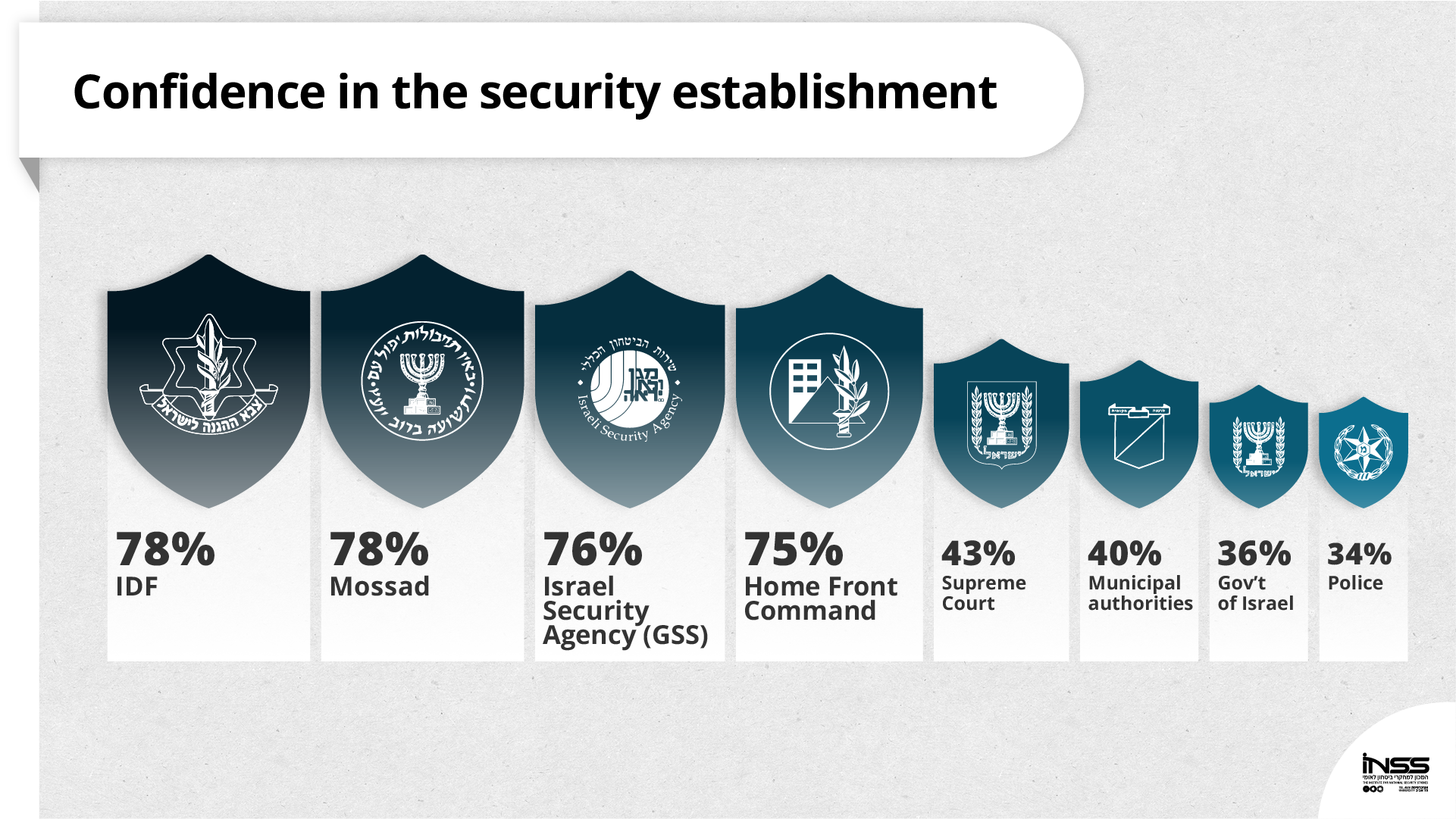
External (“Security”) Threats and Challenges
Over the years, the majority of the public has consistently felt that the State of Israel can successfully cope with external security threats, including: terrorist attacks (58 percent), serious harm to the home front in the case of a military conflict (59 percent), and simultaneous escalation on the northern front, the south, and the West Bank (56 percent). This confidence declined by 7-10 percent this past year. The confidence in Israel’s ability to cope with external security threats, as appears in the last index, is related to the high level of confidence in the IDF among the public, and its perception that the army is prepared to handle these conflicts successfully: 80 percent responded that the IDF is ready for the next military conflict. However, only 45 percent of the public thought that Israel would be able to cope successfully if Iran has the ability to attack Israel with nuclear weapons (Figure 2).
As to external threats, 2021 was not characterized by the same relative quiet as was 2020, and thus the severity of these threats was judged differently. Operation Guardian of the Walls, the riots in the cities with Jewish and Arab populations, the escalation in Jerusalem, and the stabbing attacks in November and December upset the relative calm that prevailed in the Israeli-Palestinian arena in recent years. Thus, unlike the past few years, the majority of the public ranked the threat posed by the Israeli-Palestinian conflict and the threat of a nuclear Iran as the most significant threats (Figure 3). The Israeli-Palestinian conflict, together with the threat of Hamas in Gaza, climbed to the top of the list, with 31 percent of the public defining them together as the most significant. In addition, unlike the years after the nuclear deal between Iran and the world powers was reached (i.e., since 2015), when a nuclear Iran was not seen as a severe threat, over the past three years, once the United States withdrew from the agreement and Iran advanced its nuclear program significantly, this threat is once again perceived as the leading threat (23 percent).
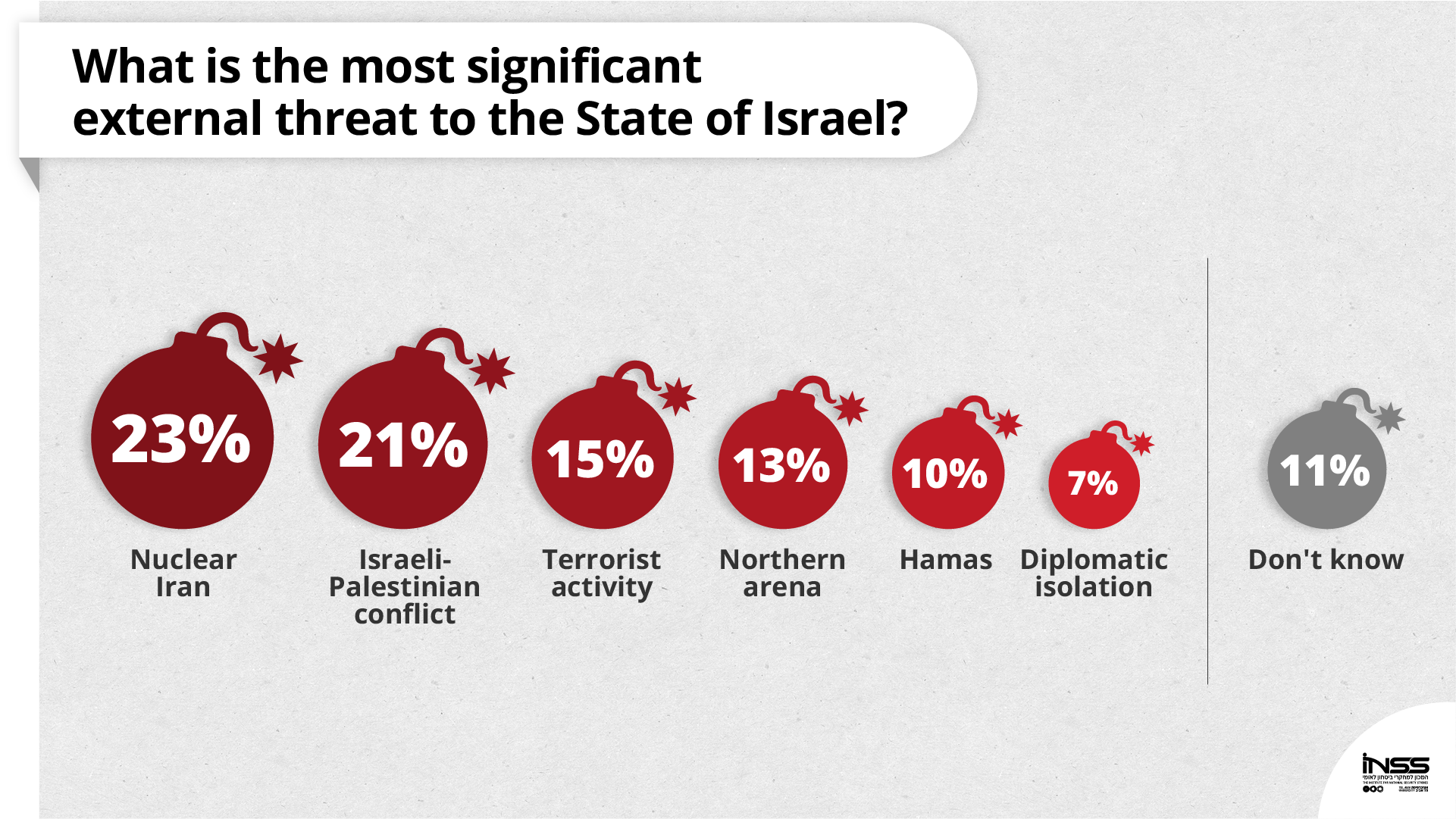

This perception likely led a significant portion of the public to support taking military action against the threat (57 percent). Israelis supported taking military action against Iran in coordination with the United States if it became clear that Iran decided to cross the threshold and produce a nuclear weapon, but a considerable portion supported such action even without coordination with the United States. Unlike the previous year and against the backdrop of the renewal of the nuclear talks between the world powers and Iran, less than a fifth of the public (16 percent) supported placing pressure on the United States to achieve an improved nuclear deal. There was also little support for the possibility of working to bring about regime change in Iran (10 percent). Only a negligible minority thought that a diplomatic channel should be opened with Iran (7 percent) (Figure 4). Support for proactive military action, sometimes also at the cost of risking an escalation to war, was also evident regarding Iran’s arming of Hezbollah with precision missiles. Perhaps the support for proactive military action is related, even if only in part, to the sense of confidence in the ability to cope with military threats, as well as the high level of confidence in the security organizations.

The Internal-Societal Threats
The index’s findings in recent years show that the public is much more concerned about internal societal threats in Israel than the external military threats to Israel (66 percent vs. 27 percent) (Figure 5). Furthermore, in contrast with the high level of confidence in the country’s ability to cope with external threats successfully, confidence in its ability to cope with internal threats is lower and characterized by a considerable decline over recent years. For example, in 2021 the public was concerned about the country’s ability to cope with governmental corruption (40 percent) and with polarization between different sectors (38 percent) (Figure 2). As shown in Figure 6, the internal tension that most worried Israelis was the tension between Arabs and Jews in Israel (43 percent), followed by the tension between the political right and left (24 percent). Class and socioeconomic tension, the tension between ultra-Orthodox and secular Israelis, and tension based on ethnic background within the Jewish community lagged behind. Against this background it is evident why this year again, similar to last year, the majority of the public thought that the country needs to change its priorities, such that economic, societal, and law and order issues receive priority over the defense budget (61 percent) (Figure 7).

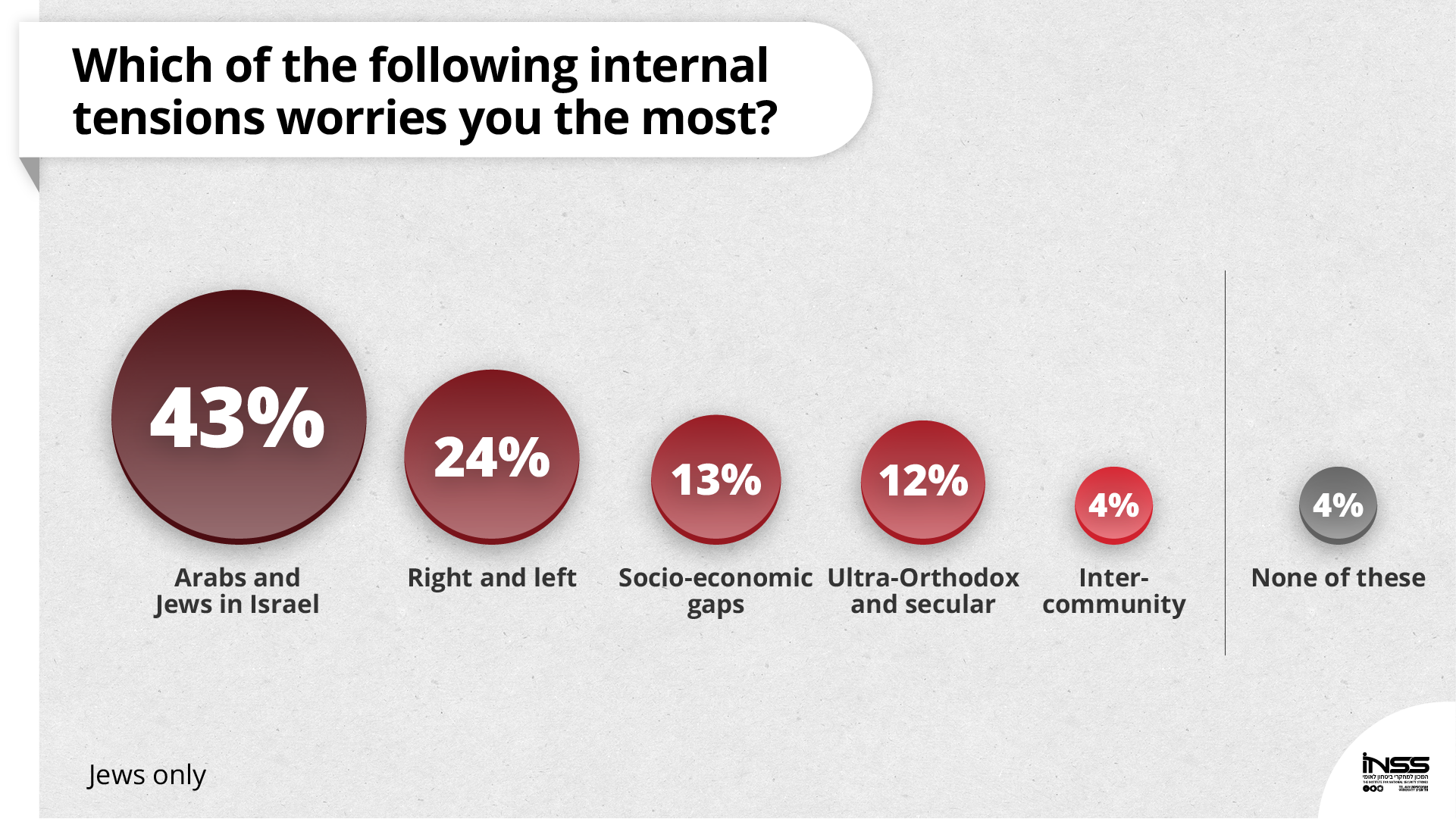
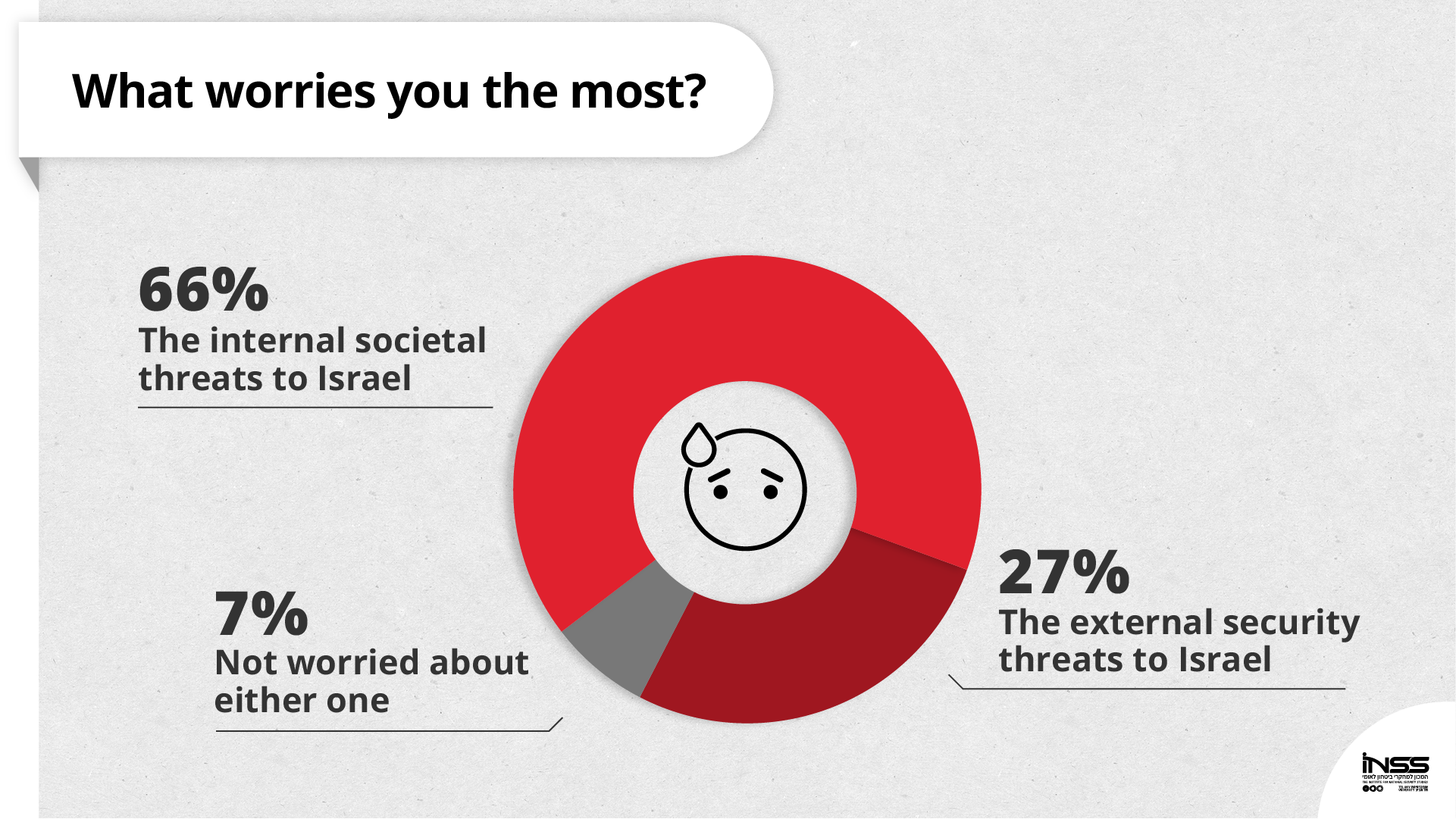
Finally, it is evident that the Jewish and democratic character of the state is important to the public. The public continued to rank the value of “a state with a Jewish majority” as the most important (42 percent), followed by the value of “a democratic state” (30 percent), whose ranking has risen significantly in the past two years. The values “state of peace with our neighbors” and “Greater Land of Israel ” were defined as the most important by less than a fifth of the public, 15 percent and 13 percent, respectively (Figure 8).
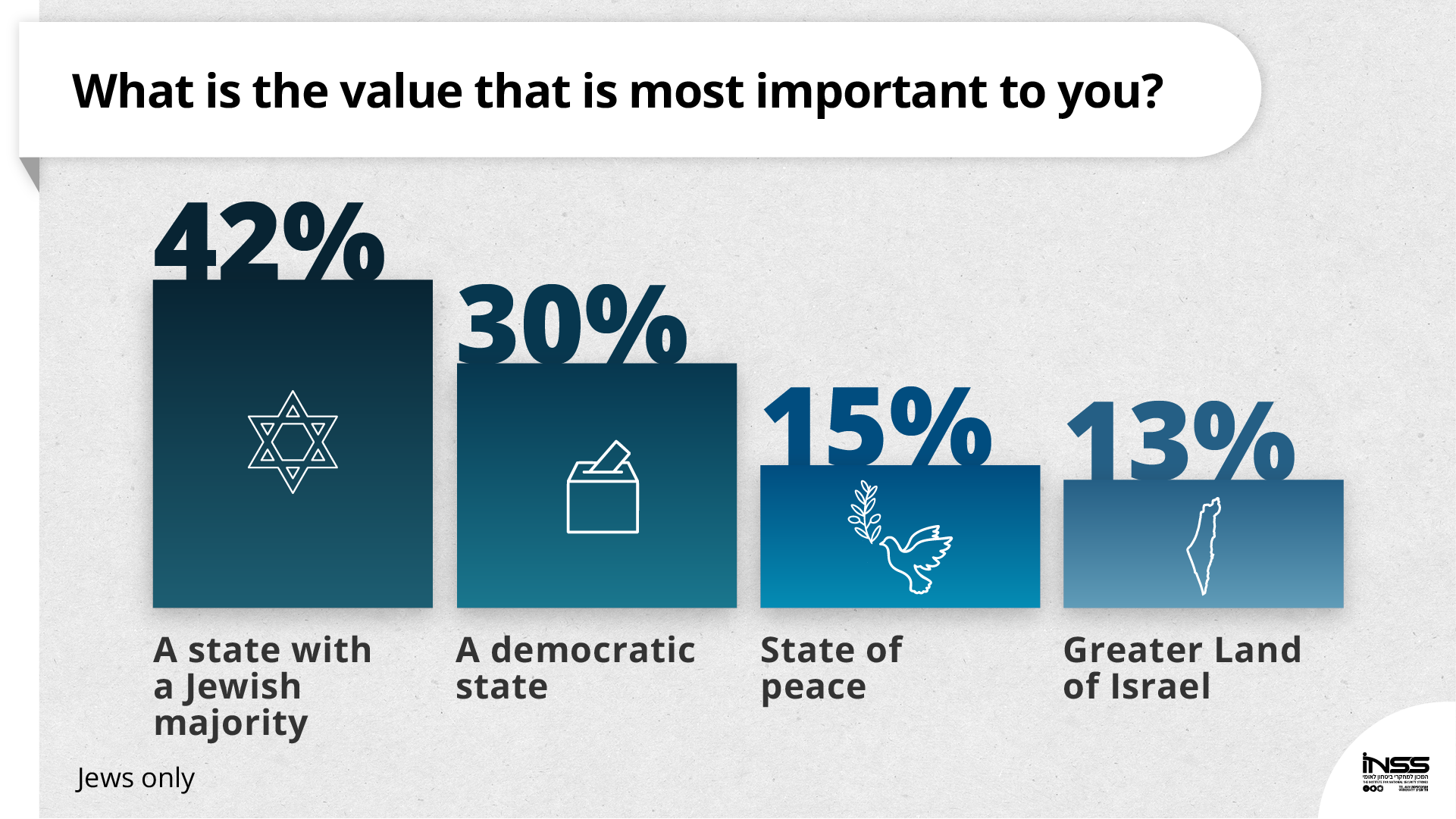
[i] The study was conducted by the INSS National Security and Public Opinion research program. The current survey was conducted in November 2021 and included an internet questionnaire and phone interviews among populations that are not accessible via the internet. 1200 respondents were interviewed among the Jewish population and the Arab population, which is a representative national sample of the entire adult population in Israel from the age of 18 and up. The maximum margin of error for the entire sample is 3.7±% with a 95% confidence interval. The study was conducted in cooperation with Midgam Consulting and Research.


